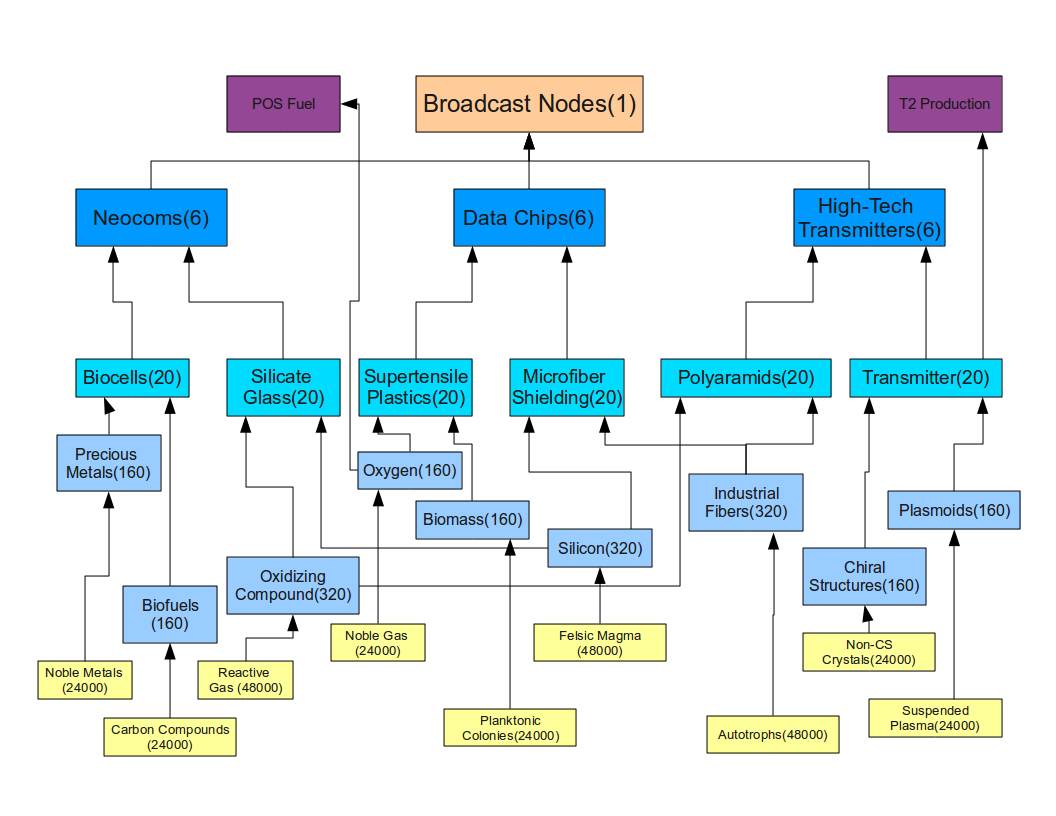Template:Planetary Interaction links Planetary Commodities are the resources and products of Planetary Industry, a big part of Planetary Interaction. There are several tiers available with the end-products becoming larger and more complicated each tier.
Inspiration drawn from https://spreadsheets.google.com/ccc?key=0ArlHEr5t26lndDN3QVhBODJ3YnF5MWVMcUQ0bHdxQXc&hl=en
Color legend
- Yellow = Resource
- Green = Tier 1 Product (P1)
- Aqua = Tier 2 Product (P2)
- Blue= Tier 3 Product (P3)
- Pink = Tier 4 Product (P4)
- Gray= No known immediate use (without further processing)
- Violet = Is or can be used to produce an end product: POS Fuel, Nanite Repair Paste, T2 components, POS / Sov structures, Mobile Structures, Implants
- Red= Component in another PI Product
Tier 1 - Processed Materials (P1)
Raw Materials (R0) can be processed into Processed Materials (P1) in Basic Industry Facilities. See the Planet page for more information on Resources. Planets listed are where the Resource can be found and thus which planets can create the appropriate P1 component without importing anything.
One processed batch turns 3000 units or 30 m³ of a P0 material into 7.6 m³ of a P1 material, resulting in a reduction to 25% of original volume. Each batch takes 30 minutes to process in a Basic Industry Facility (BIF). You thus need to have enough extractor heads to supply 3000 units of P0 in 30 minutes, or 6000 units per hour to the BIF, to avoid idle time on it.
Tier 2 - Refined Commodities (P2)
Processed Materials (P1) can be turned into Refined Commodities (P2) in Advanced Industry Facilities (AIF). It takes two different P1 items to create one P2 item. Cycle time for each batch is 1 hour. The output of (2) BIFs, 1 per P1 material, can be routed directly into an AIF that is producing a P2 commodity without any waste.
One processed batch turns a combined 30.4 m³ of two P1 materials into 7.5 m³ of a P2 material, again resulting in reduction to approximately 25% of original volume
Tier 3 - Specialized Commodities (P3)
It takes two or three different Refined Commodities (P2) to create Specialized Commodities (P3) in Advanced Industry Facilities
One processed batch turns a combined 30 or 45 m³ of two or three P2 materials into 18 m³ of a P3 material, with volume reduction now only to 40% or 60%
Tier 4 - Advanced Commodities (P4)
Advanced Commodities (P4) are created in High Tech Production Plants (HTPP) and take either three Specialized Commodities (P3) each or two P3s and one P1. The cycle time for a P4 schematic in a HTPP is 1 hour.
The planet icons indicate one of the easier options (fewest planets) to produce the P4, but that's not necessarily the only or best option. Plasma planets are avoided due to their rarity. You could produce all available P4 goods with an absolute minimum of five planets - Barren, Gas, Lava, Oceanic, and Temperate, but realistically you'd need more. It isn't too hard to completely avoid Plasma (substitute Barren/Lava) and Ice (substitute Oceanic/Lava), however, with Storm also somewhat optional (you can make Nano-Factories without Storm if you add more than one other planet)
One processed batch turns a combined 108 or 87.2 m³ of three P3 materials or two P3s + one P1 into one 100 m³ P4 item, making volume reduction insignificant at this point, or in the odd case when a P1 material is involved, actually increases the volume beyond the components! Yes, somebody appears to have allowed that guy talking about Perpetual Motion Devices to touch the P4 production chain. Or the "repackage" department was sleeping on the job.
Total combination quantities
This table shows the relationship between the different tiers and total quantity of materials. For convenience it only considers the max cost per tier (assumes always three P2 to make P3, and three P3 to make P4). So as an example it takes a full 432,000 R0 to produce one max cost P4, or 198,000 for a min cost P4. Better start extracting!
| P4 | P3 | P2 | P1 | |
|---|---|---|---|---|
| R0 | 432,000 | 24,000 | 2,400 | 150 |
| P1 | 2,880 | 160 | 16 | |
| P2 | 180 | 10 | ||
| P3 | 18 |
Here another IGB version of all Comodities http://fazenda.w-space.org/
Production Diagram
Sample of producing a Broadcast Node:

